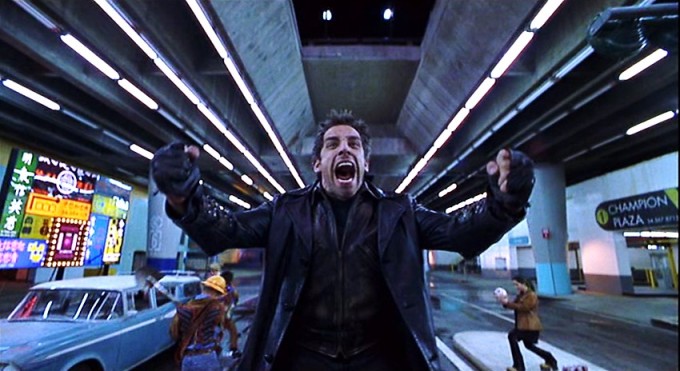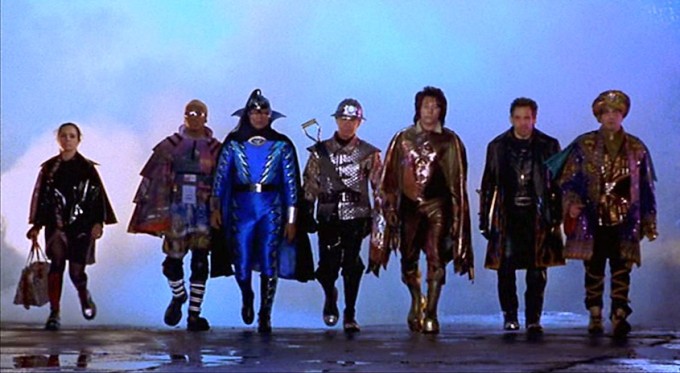directed by Kinka Usher, 1999, 122 minutes
Champion City’s celebrity superhero Captain Amazing (Greg Kinnear) leaves little work for aspiring heroes but when Amazing disappears the Blue Rajah (Hank Azaria), Shoveller (William Macy) and Mr. Furious (Ben Stiller) step up to challenge arch-villain Casanova Frankenstein (Geoffrey Rush).
Cinematic superheroes were in short supply in 1999. Christopher Reeve’s tragic Superman was fading into memory, the moribund Batman franchise had fizzled out, and Singer’s X-men were just around the corner. Warner’s ‘Matrix’ (Lana and Lilly Wachowski), Universal’s ‘Mummy’ (Stephen Sommers) and the first of the Star Wars prequels dominated the box-office. Viewers with memories of the embarrassing mess that was ‘Superman 4: The Quest for Peace’ (Sidney J. Furie, 1987) or Joel Schumacher’s turgid ‘Batman and Robin’ (1997) may have felt that Kinka Usher’s ‘Mystery Men’ was redundant, he had turned up to a demo with a crate of custard pies, but his targets had already left the building. Universal clearly saw commercial potential in Bob Burden’s surreal comic strip but were unnerved by his hero the Flaming Carrot and decided to focus instead on supporting characters. Unsurprisingly both fans and critics were left bemused but now that Marvel’s Avengers series has become the most successful film franchise of all time and as ever more obscure superheroes inundate cinema screens Usher’s time has come. Blow the dust off ‘Mystery Men’ and you will discover that many of the jokes hit their mark. Its surfeit of heroes with pointless powers feels at home in a world suffering from hero-fatigue.

Comics have come a long way since Batman and Superman began fighting crime in the 1930s. Created in a decade defined by global depression and political upheaval they embodied the fantasies and frustrations of the powerless. In the twenty-first century’s ongoing spiral of economic decline and political disillusionment it’s unsurprising that superheroes have returned to dominate cinematic culture. Outfaced by climate change, financial collapse and global terrorism we long for a saviour to make it all right again. Like the citizens of Metropolis, we watch as overpowered heroes and villains battle it out far above our heads whilst we cower to avoid being engulfed by the debris. Superhero culture shares some affinity with religious doctrines of salvation: Unable to save ourselves, we must put our trust in superior forces. The exhilaration of flight and heroic invulnerability are often part of dreaming or childhood fantasy and our longing for heroes is as ancient as humanity. Superman and Batman are little different from Robin Hood or King Arthur, indeed the cinematic tropes of the superhero have now been employed to reboot some of these older heroes: Guy Ritchie’s ‘King Arthur: Legend of the Sword’ (2017) often looks and feels like a superhero film as does his update of Sherlock Holmes (2009) where deductive reasoning is portrayed as if it’s a super power.
‘Mystery Men’ cheerfully subverts our expectations of the heroic when it introduces us to The Blue Raja (Hank Azaria) who wears green and hurls cutlery, Mr Furious (Ben Stiller) who gets really angry and the Shoveller (William Macy) who shovels. Later also meet Invisible Boy (Kel Mitchell) who, like some whimsical thought-experiment only becomes invisible when nobody is looking at him and The Spleen (Paul Reubens) who can stun with targeted flatulence. More effective is the Bowler (Janeane Garofalo) who wields a ball containing the vengeful, telepathic skull of her father. Their talents may seem obscure but ultimately each will serve some purpose. The Mystery Men remind us that heroism is not the sole preserve of the beautiful and powerful. They represent the blue-collar grafters and committed public servants who perform thankless but essential tasks every day. In contrast Champion City’s celebrity hero Captain Amazing (Greg Kinnear) is a smug, narcissistic bore whose graceless flying posture reflects his ugly personality.
For many years superheroes were more at home on television than the cinema screen but in the synergistic world of multimedia publishing comic series with byzantine timelines and multiple characters provide an endless source of raw material. As superheroes have moved from the printed page into mainstream cinema screenwriters have attempted to balance the expectations of fans with the tastes of the more general viewer who may not be so well-versed in comic lore. The wider audience exposure of cinema has revealed some of the narrative constraints of repetitive origin stories and supervillain showdowns. Representations of gender and race in comics have also come under increased scrutiny. The commercial success of ‘Wonder Woman’ (Patty Jenkins, 2017) and ‘Black Panther’ (Ryan Coogler, 2018) may have provided a welcome corrective to white male dominance but portrayal of race and gender roles remains controversial. Following Alan Moore’s lead in his novel ‘Watchmen’, Tim Burton’s ‘Batman Returns’ (1992) flirts with the significance of masks and role-play in the relationship between Bruce Wayne and Selina Kyle. Angela Robinson’s ‘Professor Marston and the Wonder Women’ (2017) wittily argues that the origins of Wonder Woman can be found as much in the subculture of 1940s sadomasochism as in the aspirations of postwar feminism, but the erotic subtext of the superhero (or heroine) remains largely taboo. Usher winks at the titillating aspects of superhero culture during an exuberant, cosplay recruitment party when the Mystery Men become entranced by two wrestling wonder women.
Most viewers who saw ‘Ironman’ (Jon Favreau) in 2008 had no idea of the commercial juggernaut that would follow but those who stayed for the now obligatory post-credits sequence may have realised that this was the first phase of a master plan for global domination. The current surfeit of superheroes is a symptom of a struggle between powerful forces: Longstanding corporate rivals Disney (who own Marvel) and Warner (who own D.C.). Disney owns big-hitters Superman, Wonder Woman and Batman but Marvel’s stable of interlinked heroes has proved more successful at the box office. ‘Mystery Men’ mocks the commercial appeal of the superhero. Captain Amazing’s costume is plastered with brand logos and Champion City’s incongruous soviet chic is encrusted with gaudy advertising, closer to Judge Dredd’s Mega City One than the urban gothic of Tim Burton’s Gotham. Director Kinka Usher began his career making commercials and clearly enjoys mocking the fickleness of celebrity marketing and the banality of product placement.

Most superhero comedies are unsuccessful. In films like ‘The Pumaman’ (Alberto De Martino, 1980) or ‘Condorman’ (Charles Jarrott, 1981) it is difficult to distinguish parody from technical ineptitude. More recently ‘Hancock’ (Peter Berg, 2008) wastes the comic potential of its drunken, misanthropic hero and lapses into blandness. ‘Mystery Men’ has a scattergun approach that encompasses slapstick, vulgarity and pastiche but some effective comic performances help it along. Mr. Furious’ (Ben Stiller) is too slow for verbal sparring, his ripostes hilariously misquoted and hopelessly mistimed. William Macy engages just the right level of earnest deadpan for the Shoveller and Hank Azaria enjoys some dapper verbal acrobatics as the Blue Rajah. Geoff Kinnear’s obnoxious turn as Captain Amazing is a wicked pleasure that easily upstages Geoffrey Rush’s forgettable villain. Some of the jokes wear thin, particularly the incessant antimetabole of The Sphinx (Wes Studi) but viewers familiar with superhero product will appreciate the risible exposition dumps, portentously named MacGuffins (for ‘psycho-frakulator’ read ‘Infinity Stones’ or ‘Mother Box’) and the tedious soul searching (or heroic bickering) that marks time between action sequences.
Those interested in superhero culture should read Alan Moore’s ‘Watchmen’ (D.C., 1986) and then watch Zach Snyder’s underrated film version. Moore offers a rigorous critique but also a celebration of the comic-book hero, revealing the limitations of the form whilst demonstrating its potential for eloquence and moral complexity. Kinka Usher’s ‘Mystery Men’ may lack the intellectual ambition of Moore’s writing or the comic ingenuity of Burden’s original strip but in the years since its release this affectionate send-up of comic culture has grown in relevance. Watched as an antidote to superhero saturation “Mystery Men” has a pleasing sense of mischief and a touch of humanity absent from much of Marvel and D.C.’s product.
Quotes
“We struck down evil with the sword of teamwork and the hammer of not bickering”
The Shoveller (William Macy)
“I think we would all like this victory to go out to all the other guys. And I’m talking about all the people in this city who are super good at their jobs…but never get any credit, like the lady in the D.M.V. – that’s a rough job.”
The Shoveller (William Macy)
Connections
Film
‘Superman 2 (The Richard Donner Cut)’ directed by Richard Donner (1980, 2005)
‘Batman Returns’ directed by Tim Burton (1992)
‘Unbreakable’ directed by M Night Shyamalan (2000)
‘X-Men 2’ directed by Bryan Singer (2003)
‘Dark Knight’ directed by Christopher Nolan (2008)
‘Watchmen’ directed by Zack Snyder (2009)
‘Birdman (or the unexpected virtue of ignorance)’ directed by Alejandro Gonzáles Iñárritu (2014)
‘Future Shock! The Story of 2000AD’ directed by Paul Goodwin (2014)
‘Professor Marston and the Wonder Women’ directed by Angela Robinson (2017)
Reading
Alan Moore, Dave Gibbons, Watchmen, D.C. Comics, 1986, ISBN 1852860243
Frank Miller, Klaus Janson and Lyn Varley, Batman: The Dark Knight Returns, D.C. Comics, 1986, ISBN 0907610900
Bon Burden, Flaming Carrot Comics 1: Man of Mystery, Dark Horse Comics, 1997, ISBN 9781569712634.

You must be logged in to post a comment.